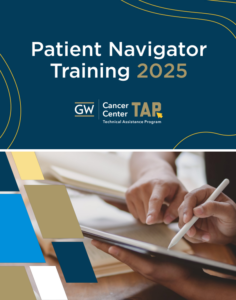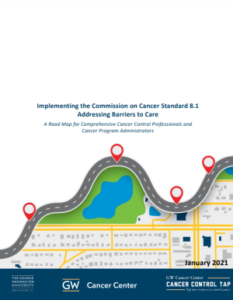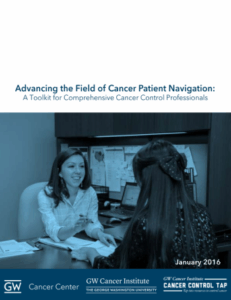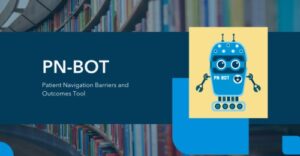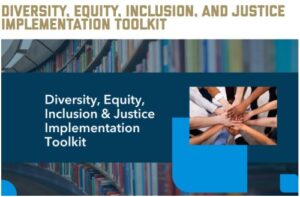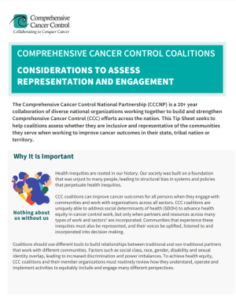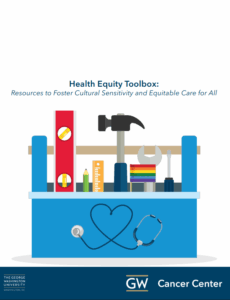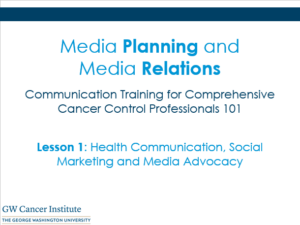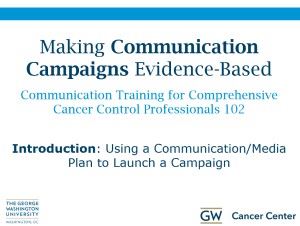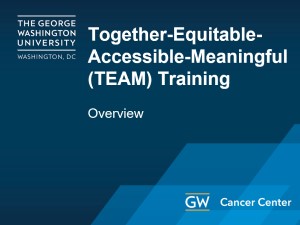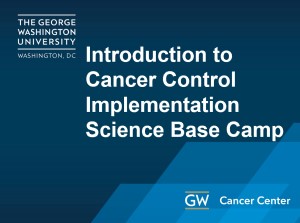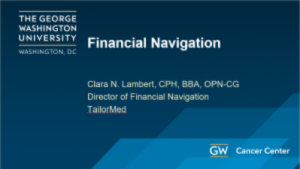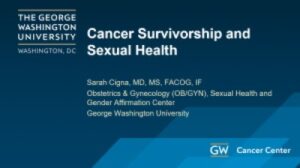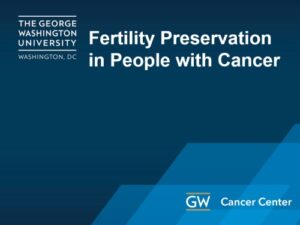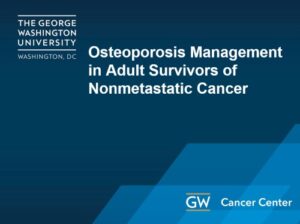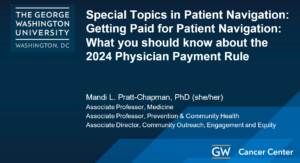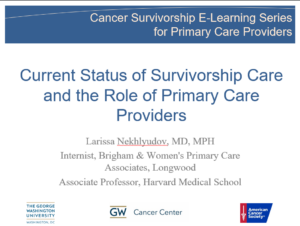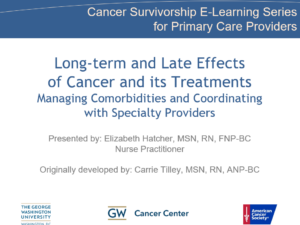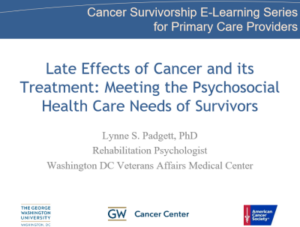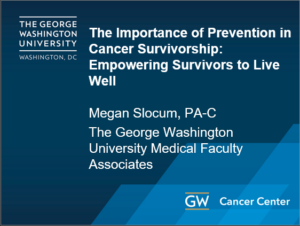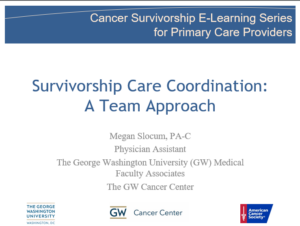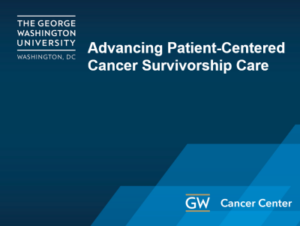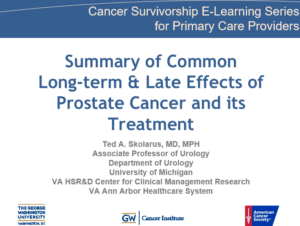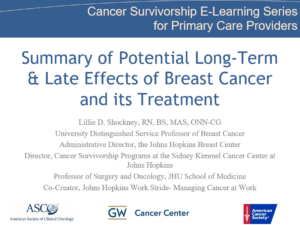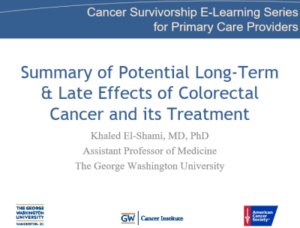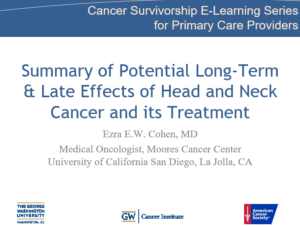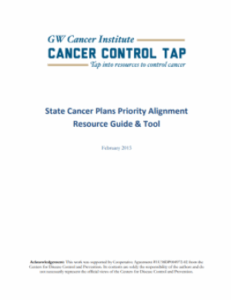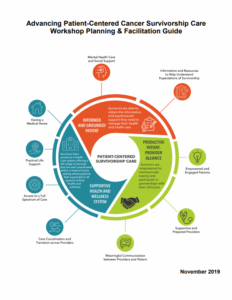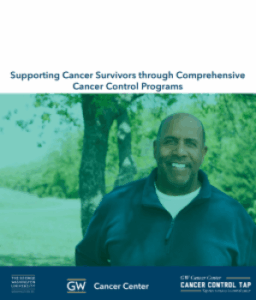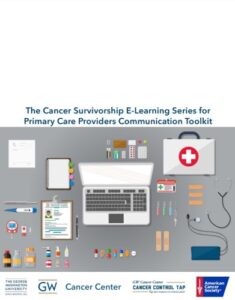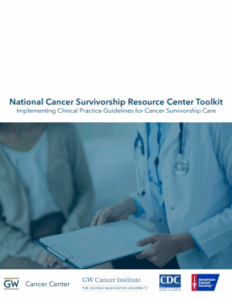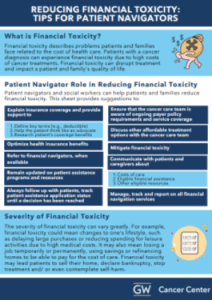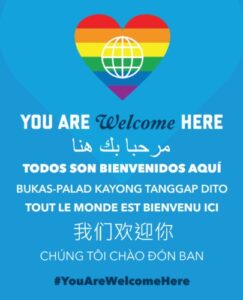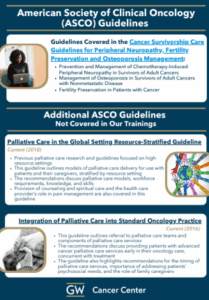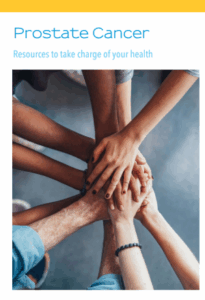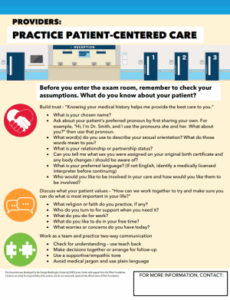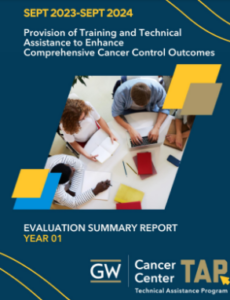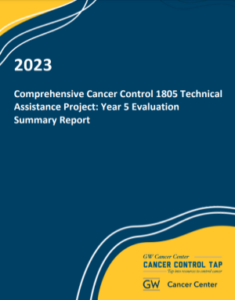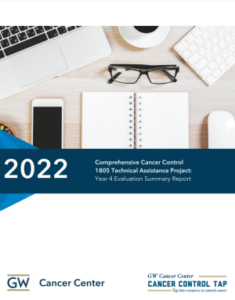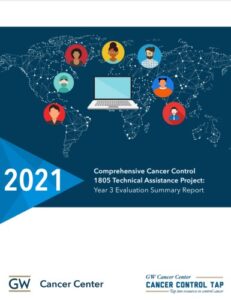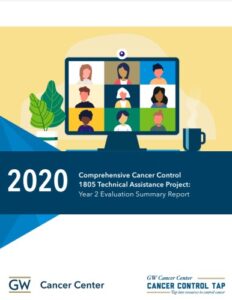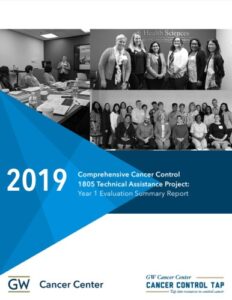Home/GW Training and Resources
GW Tools and Resources
For over 10 years the GW Cancer Center Technical Assistance Program has been producing high quality and CDC approved materials to support Comprehensive Cancer Control.
Patient Navigation Resources
Patient Navigation Training, Guides and Lessons
The GW Cancer Center first developed a comprehensive, competency based training in 2015 and it was completely revised, updated and relaunched in 2025 in both English and Spanish. Visit this section of our website to see the new training and guides to support the training. We also make all of the lesson materials available in easy to download formats of PDF and Power Point so learners can use and adapt materials as needed.
Implementing the Commission on Cancer Standard 8.1: Addressing Barriers to Care
This road map guides comprehensive cancer control (CCC) professionals and cancer program administrators from hospitals, treatment centers and other facilities to fulfill the requirements for this standard. The purpose of this road map is to guide CCC professionals and administrators in
identifying and addressing barriers to accessing health and/or psychosocial cancer care for cancer patients.
We developed this toolkit to guide states in advancing patient navigation. Although there are several types of navigators for which the information presented may be relevant, the focus of the toolkit is largely on oncology patient navigators.
Patient Navigation Barriers and Outcomes Tool (PN BOT)
The Patient Navigation Barriers and Outcomes Tool (PN-BOTTM) is a free, Excel-based data entry, data management and reporting product designed for oncology patient navigation programs. Navigation programs can use the PN-BOTTM to document, track and generate simple reports on information on program metrics.
Health Equity Resources
Diversity, Equity, Inclusion and Justice Implementation Toolkit
A toolkit designed to help multidisciplinary cancer care teams identify key organizational priorities for DEIJ and initiate organizational change. This toolkit is based on a pilot training series in which the GW Cancer Center, The Medstar Health Research Institute and Washington Cancer Institute, and Howard University Cancer Center collaborated.
Considerations to Assess Representation and Engagement for Cancer Control Coalitions
This Tip Sheet seeks to help coalitions assess whether they are inclusive and representative of the communities they serve when working to improve cancer outcomes in their state, tribal nation or territory.
Downloadable Trainings
Visit the GW Online Academy where all of the below trainings are available for free online. We have made these trainings available to you for download for ease of accessibility and to allow for adaptation.
Please include the following acknowledgment if materials are adapted:
This content was adapted from the GW Cancer Center the Oncology Patient Navigation Training: The Fundamentals (PI: Pratt-Chapman) developed and maintained by CDC cooperative agreements #NU38DP004972, #5NU58DP006461 and #NU58DP007539. The content added, changed, or adapted by our organization do not necessarily represent the views of the GW Cancer Center or the CDC.
Communications 101: Media Planning and Media Relations
Learn differences between health communication, social marketing and media advocacy.
Communications 102: Making Communication Campaigns Evidence-Based
Learn differences between health communication, social marketing and media advocacy and apply principles to public health communication and marketing to complete a media plan.
Together, Equitable, Accessible, Meaningful (TEAM) Training
A training for health care professionals who deliver cancer-related services focused on health equity to improve the productivity of patient-provider interactions through individual and systems-level approaches.
Action for Policy, Systems and Environmental (PSE) Change: A Training
A training to learn the process of PSE change as an evidence-based approach to improve health and distinguish between PSE change initiatives and conventional public health interventions.
Implementation Science Base Camp
A training for cancer control practitioners to learn implementation science concepts related to cancer screening and equity work.
This lesson covers how to define financial toxicity and its impact on patient wellness. You will learn how to describe components of financial navigation Identify resources to meet patient financial challenges, also access sample evaluation tools to show value of financial navigation in practice.
Cancer Survivorship and Sexual Health
This course teaches how to describe how different cancer treatments can affect sexual health, teaches about tools for sexual health evaluation in cancer patients and describes strategies to mitigate cancer treatment-related sexual health issues.
Fertility Preservation in People With Cancer
This lesson introduce learners to the American Society of Clinical Oncology (ASCO) guideline summary on fertility preservation in patients with cancer. This lesson Describes the impact of cancer and cancer treatment on fertility, Identifies methods of fertility preservation in different populations diagnosed with cancer and explains the role of the health care provider in fertility preservation for patients with cancer.
Management of Osteoporosis in Survivors of Adult Cancers With Non-metastatic Disease
Introduces learners to the American Society of Clinical Oncology (ASCO) guideline summary on managing osteoporosis in survivors of adult cancers with non-metastatic disease. Learners will be able to identify the associations between cancer, cancer treatment, and osteoporosis, describe the management of osteoporosis in adult survivors of non-metastatic cancer and then describe the role of the Primary Care Clinician in this.
Introduces learners to the American Society of Clinical Oncology (ASCO) guideline summary on managing chemotherapy-induced peripheral neuropathy in survivors of adult cancers. Learners will be able to identify chemotherapy agents associated with neuropathy in adult patients with cancer and associated symptom, describe strategies to prevent chemotherapy-induced peripheral neuropathy, and describe strategies to treat chemotherapy-induced peripheral neuropathy that develops during or after neurotoxic chemotherapy
Late Effects of Cancer and its Treatments: Meeting the Psychosocial Health Care Needs of Survivors
This module provides an in-depth look at the psychosocial impact of cancer and recommendations on how to support the psychosocial needs of cancer survivors.
A Team Approach: Survivorship Care Coordination
This module provides insight into the need for survivorship care coordination, the use of survivorship care plans as a communication tool and the role of oncologists and primary care providers in post-treatment care.
Cancer Recovery and Rehabilitation
This module provides an overview of the role of rehabilitation in post-treatment care as well as the importance of spirituality and interventions to support cancer survivors.
Download SlidesProstate Cancer Survivorship: Clinical Follow-Up Care Guideline for Primary Care Providers
This module provides an overview of long-term and late effects specific to prostate cancer and its treatment. Learners will also be introduced to the American Cancer Society Prostate Cancer Survivorship Care Guideline and recommendations on how to use the guideline in practiceBreast Cancer Survivorship: Clinical Follow-Up Care Guideline for Primary Care Providers
Colorectal Cancer Survivorship: Clinical Follow-Up Care Guideline for Primary Care Providers
This module provides an overview of long-term and late effects specific to colorectal cancer and its treatment. Learners will also be introduced to the American Cancer Society Colorectal Cancer Survivorship Care Guideline and recommendations on how to use the guideline in practice.Cancer Coalition Tools
State Cancer Plans Priority Alignment
Resource Guide & Tool
To help states better align their goals and activities with various national public health priorities and indicators, the GW Cancer Center created a State Cancer Plans Priority Alignment Tool that summarizes top priorities and can be used as a guide for goal setting at the state and local levels.
Considerations to Assess Representation and Engagement for Cancer Control Coalitions
This Tip Sheet seeks to help coalitions assess whether they are inclusive and representative of the communities they serve when working to improve cancer outcomes in their state, tribal nation or territory.
Seven Steps for Policy, Systems and Environmental Change: Worksheets for Action
This Seven Steps for Policy, Systems and Environmental Change: Worksheets for Action is a companion to Policy, Systems and Environment (PSE) information included on the George Washington University (GW) Cancer Center Training & Technical Assistance website and Action for PSE Change: A Training. The GW Cancer Center developed these resources to assist comprehensive cancer control (CCC) professionals in planning, designing, implementing and evaluating PSE change initiatives. Each is organized around the seven steps of the PSE change process.
Implementing the Commission on Cancer Standard 8.1: Addressing Barriers to Care
This road map guides comprehensive cancer control (CCC) professionals and cancer program administrators from hospitals, treatment centers and other facilities to fulfill the requirements for this standard. The purpose of this road map is to guide CCC professionals and administrators in
identifying and addressing barriers to accessing health and/or psychosocial cancer care for cancer patients.
Advancing Patient-Centered Cancer Survivorship Care
Workshop Planning & Facilitation Guide
The GW Cancer Center developed the Advancing Patient-Centered Cancer Survivorship Care Toolkit to support training and technical assistance from Comprehensive Cancer Control Programs/Coalitions to health care providers/organizations in order to improve patient-centered cancer survivorship care in their state, tribe
or territory. The toolkit focuses on the post-treatment care of adult cancer survivors.
We developed this toolkit to guide states in advancing patient navigation. Although there are several types of navigators for which the information presented may be relevant, the focus of the toolkit is largely on oncology patient navigators.
Supporting Cancer Survivors through Comprehensive Cancer Control Programs
The purpose of this survivorship report is to present a national snapshot of the current state of cancer survivorship in the U.S., including what we know about the health status, needs and disparities among survivors. The focus of this report will be on post-treatment survivorship issues. We will also highlight some systems-level approaches to addressing needs for posttreatment cancer survivors. The intent of this report is to serve as a brief guide for comprehensive cancer control (CCC) program efforts to help CCC groups advance goals in their state, tribe or territory.
Clinical Tools
Patient Navigation Barriers and Outcomes Tool (PN BOT)
The Patient Navigation Barriers and Outcomes Tool (PN-BOTTM) is a free, Excel-based data entry, data management and reporting product designed for oncology patient navigation programs. Navigation programs can use the PN-BOTTM to document, track and generate simple reports on information on program metrics.
Cancer Survivorship Learning Series Toolkit
This toolkit is designed to help stakeholders establish a communication strategy to promote the Cancer Survivorship Series for Primary Care Providers (E-Learning Series), implement social media content best practices, and disseminate Series messaging.
I Want You to Know Printable Card
This “I Want You to Know” printable card can help patients begin a conversation with their provider about their identity and care preferences. Versions of the cards are available in English, Spanish and Chinese (simplified). Interested in branding the cards with your organization’s logo? There’s a blank version so your organization can insert their own logo and contact information if needed. A GW Cancer Center-branded version is also available.
National Cancer Survivorship Resource Center Toolkit
This toolkit provides resources to help with implementing the American Cancer Society cancer survivorship care guidelines for colorectal, head and neck and prostate cancers and the American Cancer Society/American Society of Clinical Oncology cancer survivorship care guideline for breast cancer. In addition to the guidelines, information is included on training opportunities for primary care providers and patient materials to help activate cancer survivors to be full participants in their survivorship care
Reducing Financial Toxicity: Tips for Patient Navigators
This companion tip sheet from the GW Cancer Center describes financial toxicity, outlines the role of patient navigators in supporting and mitigating financial toxicity, and provides a list of helpful resources to support financial navigation. A Spanish version, developed in collaboration with Nuestras Voces (Our Voices) Network, is also available.
American Society of Clinical Oncology (ASCO) Guidelines
-Management of Osteoporosis in Survivors of Adult Cancers
with Nonmetastatic Disease
Prostate Cancer Resources for transgender women and nonbinary persons with a prostate
Transgender women and gender non-conforming individuals have health care needs that are often not talked about. It may be uncomfortable to think about parts of the body that may still be there after you have transitioned. This fact sheet is only a starting point. It can help you talk with your doctor if you have prostate cancer. There are also tips for you and your partner(s) to help manage the effects of treatment. The resources list on the back has more information.
Prostate Cancer Resources for Gay and/or Bisexual men
Gay and bisexual men have health care needs that are often not talked about. This fact sheet is for men who have sex with men and have been diagnosed with prostate cancer.
This fact sheet is only a starting point. It can help you work with your health care team and help you manage the effects of treatment. The resources list on the back has more information for you and your partner(s).
Practice Patient-Centered Care Poster
This poster reminds providers to practice patient-centered care with a few simple reminders. It can be used by providers, public health professionals, community health centers, clinics, hospitals or other organizations. This resource aims to improve the productivity of patient-provider interactions to promote equitable, accessible and patient-centered care that results in better health outcomes for those impacted by cancer.

